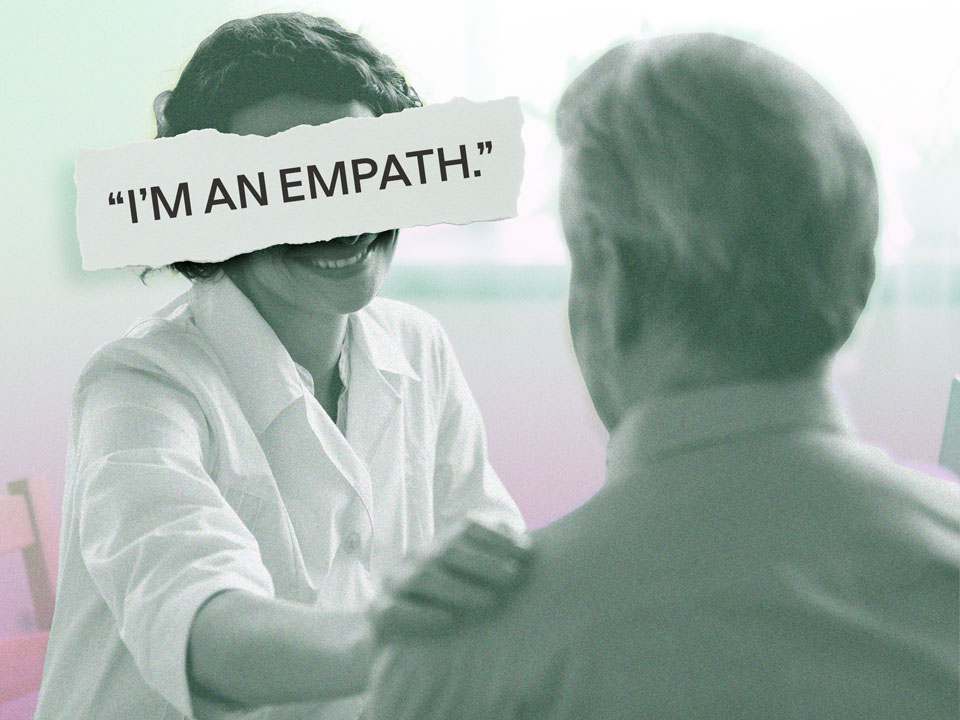Calling All Empaths: Here’s What This Actually Means
Feeling everyone’s feelings? Let’s talk about it.
It feels like everyone on the internet has learned the word empath this year: TikTok therapists, Bravolebrities, your last situationship. But as with any mental health-focused trend that gains popularity online, it’s hard to discern if everyone is actually using this term correctly. So, what is an empath, exactly?
On the surface (aka social media), it seems like an empath is someone who deeply feels what other people are feeling. If your friend is crying, you’re fighting off tears. If your boss is anxious as f*ck for reasons that have nothing to do with you, you’re on edge. If the checkout guy at CVS is being Karen-ed by the person ahead of you in line, you get mad too. In the words of Kristin Doute on a recent episode of The Valley: “I cannot help but feel every single person’s feelings when I’m in a room, and I take it home with me. It is so hard to be an empath.”
OK but…isn’t everyone capable of feeling other people’s feelings—at least some of the time? Whether you identify with the label of or not, here’s what a few mental health pros say about what it really means to be an empath, whether it’s a real thing, and how to deal if you can’t stop feeling other people's feelings.
What is an empath?
First, lemme explain empathy, aka the origin story of the empath. Edward Titchener, a psychologist teaching at Cornell University, first came up with the word empathy in 1909 to describe how human beings have the capability to be in tune with another’s emotions, per an article in the Journal of Patient Experience.
Today, according to the American Psychological Association, empathy has come to mean the feeling of “understanding a person from their frame of reference rather than one’s own, or vicariously experiencing that person’s feelings, perceptions, and thoughts.” Empathy is the reason you understand that the helpless CVS clerk is freaked out and you might even feel it too.
Empathy or emotional sensitivity in general can also exist on a spectrum of sorts, says psychologist Jenny Wang, PhD. “On one end is a complete lack of empathy, sensitivity, and interest in others,” she explains. “On the other end, an individual may struggle to differentiate between their own emotional life and the emotional life of others.”
If you call yourself an empath, you’re basically saying that you’re so sensitive to other people's emotions that you can physically feel them and, in theory, you might confuse them for your own, says psychiatrist Judith Orloff, MD, author of The Genius of Empathy. You know the phrase “putting yourself in someone else’s shoes”? That’s basically what an empath is doing at all times, says Dr. Orloff.
Are empaths real?
It depends who you ask. Clinically speaking, being an empath is not a diagnosis you’d find in the Diagnostic and Statistical Manual of Mental Disorders (DSM-5-TR). It’s not even a psychological term most mental health pros use, says Amy Canevello, PhD, an assistant professor of psychology at the University of North Carolina, Charlotte who studies prosocial behavior.
Though the label suggests empaths connect to others in a special way, whether that’s actually true is a little dicey, says Dr. Canevello. “Because this idea of an empath doesn’t really appear in the scientific literature and we don’t really have a good definition, it feels like an empath can be whatever you want it to be,” she adds.
Dr. Wang says that if one of her clients said they were an empath, she would ask them questions to understand what that term means to them and how it’s impacting their life. “I would be curious if this client had concerns or wanted to learn skills around the setting boundaries that might need to exist in order to protect them from other people's emotions,” she says.
That said, psychologists have been studying empathy for a while, says Dr. Canevello. And there’s some evidence to suggest you can take on the emotions of other people, or what’s called affective empathy, she explains.
Some studies suggest humans’ and other mammals’ empathy is part of our prosocial behavior, or the kind of actions that enable us to support each other through struggles, thus increasing our species’ chances of survival. Those studies also found that empathizing with another’s pain or distress can make you feel crappy too (though, maybe you don’t need a study to tell you that).
Researchers have reported that when we experience empathy, the parts of our brain in charge of interpreting our own emotional and physical pain are activated. “We are able to understand and share the emotions of others by (partially) processing them with our very own emotion system(s),” the study authors write.
There’s also some evidence that brain cells called mirror neurons, which fire off when you see something being done and when you do it yourself, could make it possible for you to feel what others are feeling.
In fact, a small study analyzing the brains of people with psychopathic traits (see: low levels of empathy) found less mirror neuron activity in their brains than in others. In another, researchers write that people who said they’re more empathetic had more mirror neuron activity than those who didn’t. So there’s that!
Basically, most of us are wired to feel for others, and you don’t have to be an empath to do that. That said, regardless of the title, it is possible that some people on the higher end of the empathy scale feel others’ emotions more deeply or in a way that interferes with how they live their life, says Dr. Wang.
How to handle being an empath
Given all of that, if you still want to call yourself an empath, that’s cool! No judgment. But the best thing you can do to avoid taking on others’ emotions regardless of the label is to protect your peace.
That’s especially true since experiencing trauma, abuse, or having an insecure attachment style is related to hypervigilance, which can make you more attuned to others emotions, explains Dr. Wang. If that’s the case, you could “turn on that part of the mind that says, I have to be constantly scanning my environment, and part of that is picking up the emotional data that other people are emitting in order to feel safe,” she adds. Of course, you might just be born as a more agreeable, conscientious person. That’s possible too.
Whatever the case, here’s what to do:
Notice how messy people make you feel.
Do yourself a solid by paying attention to how you feel when people around you have negative emotions. Do you shut down? Lash out? Obsessively problem solve? Maybe something in the middle?
Assessing your emotional capacity around people who have high-intensity emotions can help you avoid taking on too much, Dr. Wang says. Some days you might be able to hold those emotions and be there for your friends but other days you might be exhausted and overwhelmed.
Sharpen your communication.
If you get the sense that your response to others’ heavy feelings is doing more harm than good, work on setting clear boundaries. For example, if you have a friend who's trauma dumping on you all the time, be honest with them about how it affects you and ask if they can give you a warning before they vent. That way, you can decide whether you’ve got the emotional capacity to take it on. “You can still care about others and separate yourself from them,” Dr. Cavello adds.
Dr. Orloff says that learning to utilize communication skills in highly emotional moments can also be a helpful coping skill. The next time you’re feeling overwhelmed, take a pause to breathe and decide whether you can continue talking. If you need to step away, tell the other person you’ll be back once you’re feeling a little more solid. When you return, you can offer support, nod to show you’re listening, and validate the other person’s feelings, she explains.
Make time for yourself.
I mean, this is helpful for literally anyone, but when you feel like you’re taking on the emotions of others, your own needs can take a backseat. Try to set aside a small chunk of time each day or week to be present with yourself and regulate your own emotions. The only feelings you need to feel in this moment are your own.
Wondermind does not provide medical advice, diagnosis, or treatment. Any information published on this website or by this brand is not intended as a replacement for medical advice. Always consult a qualified health or mental health professional with any questions or concerns about your mental health.




